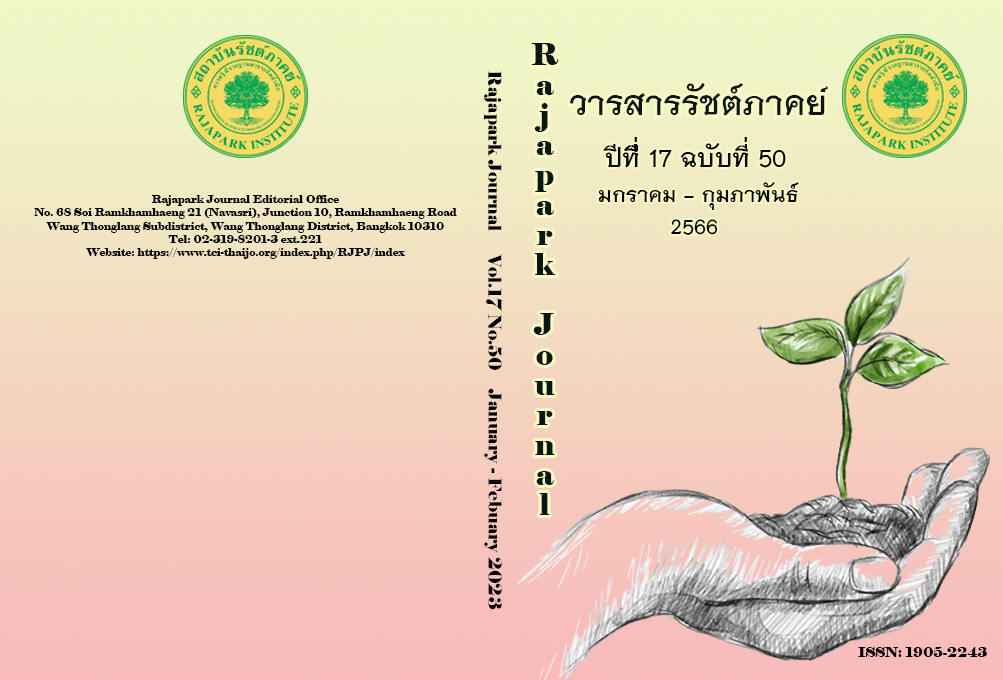Impact of Green Economy on Clean Energy Sustainable Development in Energy Industry
Main Article Content
Abstract
This research aims to study the impact of the green economy on sustainable clean energy development and investigate the clean energy’s sustainable development level classified by type of organization, i.e., private companies and government power agencies. Data were collected by questionnaire from a sample of employees who work in the energy industry from public and private organizations. The results showed that the green economy positively impacts the sustainable development of clean energy at the statistically significant level of 0.05. However, one aspect of a green economy, i.e., the utilization of resources, had no impact on the ability to access clean energy services, one component of clean energy’s sustainable development. In addition, private organizations show lower involvement in sustainable clean energy development than public organizations. Based on the results of this study, Thailand’s public and private organizations apprehend the importance of green economic and sustainable development of clean energy in response to the United Nations’ sustainable development goals. However, the reason that public organizations show a higher level of involvement in the sustainable development of clean energy than private organizations may be that most private organizations are not ready for the increased costs of the initial investment in clean energy.
Article Details

This work is licensed under a Creative Commons Attribution-NonCommercial-NoDerivatives 4.0 International License.
Views and opinions appearing in the Journal it is the responsibility of the author of the article, and does not constitute the view and responsibility of the editorial team.
References
Aroonsrimorakot, S., & Watcharadul, Y. (2016). UN Sustainable development goals: 17 aspects for future world. Journal of Thai Interdisciplinary Research, 11(3), 1-7.
Aroonruengsawat, A. (2019). Green Economy Indicator. Sigma Graphics.
Butdee, K. (2022). Clean Energy Plan: New Rule to Support Thailand in the Global Trend. https://www.bangkokbiznews.com/business/998808
CFI Team. (2021). Newly Industrialized Country (NIC). https://corporatefinanceinstitute.com /resources/knowledge/economics/newly-industrialized-country-nic/
Charuchart, K., & Leingchan, R. (2021). Thai Industry: Where to Position and How to Compete on the World Stage. https://www.krungsri.com/getmedia/e9bea61e-a8ec-44ba-b7c8-fec073437f51/RI_Thai_Sectoral_Potential_210628_TH.pdf.aspx
Denhere, V. (2022). Sustainability: The Adoption of Green Economy and Sustainable Accounting Principles by South African Listed Companies and Lessons Learnt. Research in Business & Social Science IJRBS, 11(5), 366-376.
Eianlhang, T. (2017). Responsiveness of Agro-Based-Industry in Surat Thani Province to Green and Low Carbon Economy[Master’s Thesis, Prince of Songkla University].
Fuengfung, S. (2018). Cooperation Policy between Public and Private Sectors for Promotion and Development of Small and Medium Enterprise Entrepreneurs into Green Economy. Journal of Rungsit Graduate Studies in Business and Social Science, 4(2), 174-187.
Loiseau, E., Saikku, L., Antikainen, R., Droste, N., Hansjürgens, B., Pitkänen, K., …Thomsen, M. (2016). Green Economy and Related Concepts: An Overview. Journal of Cleaner Production, 139, 361-371.
Mensah, J. (2019). Sustainable Development: Meaning, History, Principles, Pillars, and Implications for Human Action: Literature Review, Cogent Social Sciences, 5(1), DOI: 10.1080/23311886.2019.1653531
Nunnally, J. (1978), Psychometric Theory (2nd ed.). McGraw-Hill.
Senaviratna, N., & Cooray, T. (2019). Diagnosing Multicollinearity of Logistic Regression Model. Asian Journal of Probability and Statistics, 5(2), 1-9.
SDG Move. (2021). 2021 Sustainable Development Report: SDR. https://www.sdgmove.com/2021/06/14/press-release-sdr2021-files/
Sotornpitakkul, S. (2012). Creating a Green Business Strategy Toward Sustainable Business Case Study Thai Organic Food Company Limited[Master's Thesis, Silpakorn University].
Techsauce Team. (2022). Total Profit in 2021 of Thailand's 10 leading clean energy companies. https://techsauce.co/news/10-renewable-energy-companies-in-thailand
Thailand Minister Secretariat. (2021). The Thai Government Established a Bio-Circular-Green Economic (BCG) Model to be a New Economic Model for Inclusive and Sustainable Growth of the Country. https://waa.inter.nstda.or.th/stks/pub/2021/20210213-bcg-cabinet-conclusion-national-agenda.pdf
United Nations. (n.d.). Green Economy. https://sustainabledevelopment.un.org/index.php?menu=1446
United Nations Thailand. (2022). Sustainable Development Goal 7: Affordable and Clean Energy. https://thailand.un.org/th/sdgs/7
Worldometer. (n.d.). CO2 Emissions by Country. https://www.worldometers.info/co2-emissions/co2-emissions-by-country/


